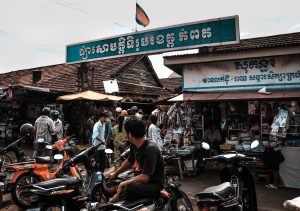The microfinance textbook doesn’t have much to say about state regulatory capacity. The idea that small loans to very poor people is effective in pulling them out of poverty is so simple and appealing that proponents have believed it to be universally applicable.
Economic agents, the theory insists, simply pursue their self-interest according to demonstrable straight lines. If poor people can’t escape poverty, the textbook looks for a blocking variable.
Lack of access to credit in unbanked populations naturally suggests itself as such a simple variable. The entrepreneurial spirit, some economists are tempted to think, exists in all of us if only it could be unleashed. Microfinance is even more beguiling as it gives Western development finance institutions (DFIs) something to do. Partnerships with local microfinance lenders can be developed. Poor countries can be studied, visited, and promising case studies compiled, or paid for.
The idea that the effectiveness of these loans might vary depending on other factors, such as the strength of local regulatory institutions, has never received much attention from microfinance proponents. Economic models usually assume that governments are rational entities that make and enforce rules, and follow them just like everyone else. The microfinance sector, the theory goes, should be able to self-regulate, with the state stepping in if necessary.
In real life though, some actors don’t follow the rules. They do bad things such as accepting money from organized crime. The actors may even be states responsible for financial regulation. Recent years have seen the growth of slave compounds operated by the Chinese mafia in Southeast Asia, where people tricked by the promise of legitimate employment are forced to work around the clock carrying out online scams. Cambodia, along with Myanmar and Laos, are the main centers of this activity.
Most of the people trapped in the slave compounds are Chinese, which leads to a simple question. Cambodia is a strong ally of China. Why does Beijing not simply insist that its junior partner sorts the problem out, or, if it can’t, stand out of the way and allow Beijing to do so?
I put that question to Jason Tower, one of the authors of a report by the United States Institute of Peace (USIP) on transnational crime in Southeast Asia published in May. His answer was simple. Cyber-scam receipts of about $12.5 billion flowing into Cambodia each year mean that “the Chinese mafia has more influence than any Chinese state-owned enterprise” over the Cambodian regime, he said. The trade-off, Tower argued, is that Cambodia supports the Chinese government on a wide range of issues in return for reduced pressure from Beijing to stop the compounds.
This wasn’t what Western microfinance investors had in mind when they started backing attempts to expand financial inclusion in Cambodia. The evidence pointing to official Cambodian complicity in cyberslavery has increased since the USIP report was published. Research published on July 10 by U.K.-based Elliptic, which specializes in Blockchain analytics for financial crime compliance, claims that users of the Huione Guarantee online marketplace offer money-laundering services, including for receipts from “pig butchering,” the process by which people globally are defrauded.
Hun To, a cousin of the current Cambodian prime minister, Hun Manet, is a director of Huione Pay, the payments and foreign exchange business of Huione Guarantee. Hun To has always denied that his company plays any part in cyber-slavery. Reuters reported on July 15 that Huione Pay received stolen cryptocurrency from a digital wallet used by hackers with the North Korean Lazarus group. Huione Pay has said it did not realize that the funds had been “indirectly” received, and Reuters says it has no evidence that Hun To or Cambodia’s ruling family had any knowledge of the crypto transactions. Cambodia’s central bank told Reuters that it would impose any needed “corrective measures” against Huione, but without saying if such action would be taken.
The capacity of the Cambodian central bank to effectively regulate financial crime compliance is unproven. The same is true for its attempts to regulate the country’s microfinance sector. As of March 2023, the microloan portfolio in Cambodia totaled 2.89 million loans worth more than $16 billion, or more than half of the GDP of a country of 16 million people. The country’s central bank said in July that it is working on a code of conduct and lending guidelines for self-regulation. The Licadho human rights group in Cambodia told me that the “multi-stakeholder process” omits the primary stakeholders, namely the borrowers.
Whether microfinance can be effectively operated in jurisdictions with stronger institutions is a larger debate. Research by W. Nathan Green and Ian Baird published in April argues that the state’s role of provider of credit to farmers in Thailand means that farmers have been able to gain better terms for credit and repayment relief than in Cambodia, where most credit is privately provided. Green and Baird’s findings are endorsed by long-term microfinance critic Milford Bateman, who argues that an effective model of state-mediated microcredit developed initially in post-war Japan has been undermined by the World Bank’s determination since the 1980s to replace it with commercially-oriented private microcredit.
Japan and Thailand clearly have much stronger state institutions than Cambodia and many other Global South countries. There is no known formula for creating effective states where they are lacking, which suggests that the scope for replicating state-driven credit models is limited. The lesson from Cambodia is that microfinance investors and DFIs must put the burden of proof on weak states to prove that they are capable of microfinance regulation. The bar on country due diligence needs to be much higher. Active skepticism before committing capital must replace retrospective box-ticking exercises.

































